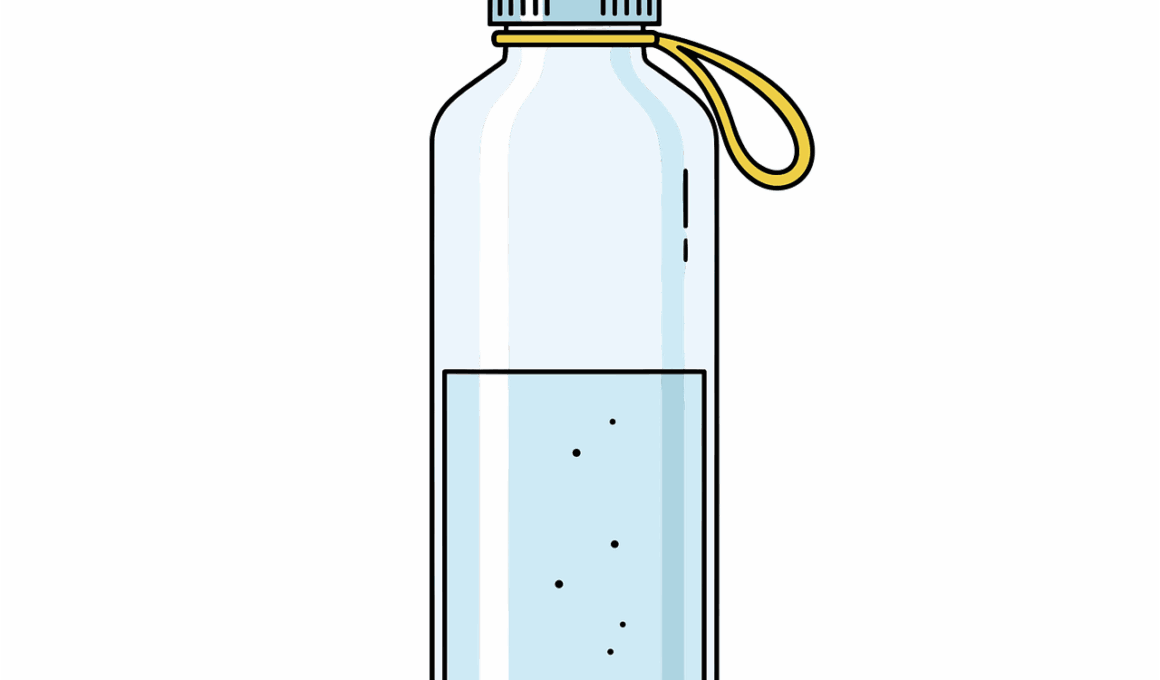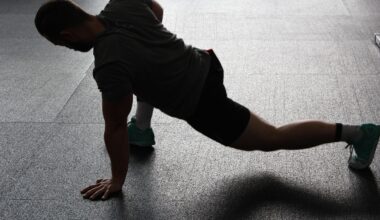The Role of Hydration in Customized Sports Nutrition Plans
Hydration is a fundamental aspect of personalized sports nutrition plans designed for athletes. Understanding how hydration affects performance is essential for optimizing physical outcomes. Athletes engage in rigorous training sessions which can lead to considerable fluid loss through sweat. This loss can cause dehydration, impacting endurance, strength, and cognitive function during crucial moments of competition. Insufficient hydration can lead to decreased physical performance, fatigue, and even injury. Tailoring hydration strategies to individual needs can benefit overall athletic performance significantly. Personalized hydration plans consider factors such as exercise intensity, duration, and environmental conditions. Athletes should monitor their hydration levels before, during, and after exercise to ensure they remain in peak condition. Regular consumption of fluids that are rich in electrolytes can aid in maintaining the necessary balance within the body. Sports drinks, coconut water, or electrolyte tablets can offer replenishment after strenuous exercise. Therefore, coaches and nutritionists should emphasize hydration as a priority in developing any personalized sports plan. They should educate athletes on effective hydration techniques to enhance their performance and recovery. Staying hydrated contributes to long-term athletic success and a healthy lifestyle.
A significant focus of personalized sports nutrition plans is how hydration develops stamina and recovery. Water plays an invaluable role in regulating body temperature and maintaining cardiovascular function. During strenuous exercise, maintaining core temperature is vital to prevent overheating and maintain performance levels. This need highlights the importance of hydration before performance events to ensure optimal physiological conditions. Additionally, hydration supports the muscle function as it maintains electrolyte balance. Sodium, potassium, and other electrolytes are lost through sweat, and their replacement can enhance muscle contraction and prevent cramps. In a personalized hydration strategy, monitoring individual sweat rates helps determine specific fluid needs. Athletes should drink adequately before workouts, ensuring they start hydrated. During exercise, consuming fluids every 15-20 minutes is crucial for maintaining performance and preventing fatigue. For immediate post-workout recovery, proper hydration should occur, ideally with fluids containing carbohydrates and electrolytes, to restore energy levels. Nutrition plans can enhance recovery, particularly when athletes engage in consecutive training sessions. Attention to hydration is equally critical during travel, where athletes can experience fluids loss without active exertion. Overall, tailored hydration decisions are fundamental components of comprehensive sports nutrition.
Electrolytes and Hydration
Electrolyte replacement is an integral facet of hydration in personalized sports nutrition specializing in optimizing athlete performance. During intense physical activity, athletes mostly lose sodium, potassium, calcium, and magnesium through sweat. When these essential electrolytes are insufficient in the body, athletes can suffer from muscle cramps, fatigue, and decreased performance. Thus, including electrolyte-rich fluids plays a key role in efficient hydration strategies. Sports drinks are tailored to restore electrolyte levels, which is vital for extending endurance and sustaining energy levels throughout training and competitions. Personalizing sports nutrition can include recommendations on using electrolyte tablets or powders, which allow athletes to control their intake during exercise. Moreover, developing specific hydration strategies that account for individual sweat rates and personal preferences ensures athletes remain at their best. Understanding the right balance of fluids and electrolytes based on athlete consultation can lead to significant gains in performance. Moreover, athletes need to learn to read their body’s signals, identifying times when electrolytes are required to prevent imbalances. This can include symptoms like headaches, muscle fatigue, or cramping signals indicating the need for improved electrolyte intake. Thus, electrolyte balance should not be overlooked in hydration plans.
Hydration can also influence mental clarity and focus, which are essential components of athletic performance. A well-hydrated athlete tends to experience better cognitive function during both training and competition. Improper hydration leads to decreased concentration, increased perception of effort, and slower decision-making processes, all impacting an athlete’s competitive edge. Introducing cognitive assessments and hydration monitoring within a personalized nutrition program can help identify specific needs. Thus, athletes may benefit from cognitive performance tests before and after hydration to understand effects more clearly. By integrating such methods, personalized hydration strategies can be better designed to maximize not just physical performance but mental resilience. Additionally, many athletes overlook hydration during lower-intensity training, mistakenly believing it’s unnecessary. However, the cumulative effects of decreased hydration can be detrimental to their performance over time. Therefore, emphasizing hydration irrespective of training intensity is crucial within individualized nutrition plans. Athletes are encouraged to establish a routine around fluid intake, ensuring regular hydration habits regardless of external conditions. With proper hydration, athletes feel energized and concentrated, allowing their physical training program to reach its peak potential and achieve desired goals effectively.
Case Studies in Personalized Hydration
Examining case studies highlights the importance of customized hydration strategies in sports nutrition. For instance, a marathon runner experienced significant improvement after adopting a personalized hydration plan that accounted for sweat rates and fluid losses. Utilizing detailed pre- and post-exercise hydration assessments helped determine specific needs tailored to the athlete. Additionally, research shows players in team sports, such as soccer and basketball, see performance benefits from adhering to personalized hydration strategies. These athletes effectively enhanced their recovery times and overall game performance by addressing individual hydration needs. Trainers noted marked differences in energy levels and concentration during matches due to better hydration practices. Moreover, controlling dehydration has shown benefits, such as decreased likelihood of heat-related injuries. Personalized hydration plans provide clarity around fluid type, quantity, transition periods, and timing before, during, and post-exercise. Educating coaches and athletes through successful case study presentations demonstrates the impact of hydration adaptations. Ultimately, continuous evaluation of hydration strategies based on individual responses contributes to sustained athletic excellence. Case studies serve as powerful tools in motivating athletes to understand and value personalized hydration within their nutrition plans.
Nutritional technology is also evolving, providing innovative methods to tailor hydration plans accurately. Advanced wearables help athletes monitor real-time hydration levels through sweat analysis, shedding light on when hydration should be prioritized. Continuous data collection and analysis prove vital in guiding athletes towards making educated hydration choices. Athletes are more inclined to stay within optimal hydration levels when tracking their intake through mobile applications, adding an interactive component to their routine. Implementing technology into personalized sports nutrition not only enhances hydration but encourages accountability among athletes. Data indicates that those using hydration tracking devices considerably improved their performance levels while feeling better overall. Additionally, insights gathered from technological advancements allow nutritionists to create better-customized hydration plans based on precise sweat loss and mineral depletion data. This partnership enhances the overall training experience for athletes and leads to healthier lifestyles moving forward. Coupled with other aspects of personalized sports nutrition plans, it facilitates improved recovery and an optimal level of performance. It sets a new standard for how we view hydration in sports science and nutrition’s future.
Conclusion: The Importance of a Personalized Approach
In conclusion, hydration plays a pivotal role in designing effective personalized sports nutrition plans. Athletes should prioritize individualized hydration strategies to maximize both performance and recovery outcomes. Comprehensive hydration planning incorporates an athlete’s unique sweat profiles, activity intensity, and exercise duration to facilitate optimal physiological responses. Moreover, understanding the interplay between hydration, cognitive function, and physical performance evolves to be a critical component in sports nutrition. This emphasizes a culture where hydration becomes an integrated part of training and game readiness. By advocating for hydration education among athletes, trainers, and coaches, we create an environment that fosters peak athletic performance. Furthermore, continuous research into personalized hydration leads to enhanced methodologies within sports nutrition, supporting the athletic community. When paired with nutrition plans, hydration strategies become an infrastructure that enables athletes to thrive. As athletes become more attuned to their hydration needs, they can train and compete at their best. Customized hydration plans will continually adapt as sports evolve, and a keen focus on hydration sustains high-level performance. Moving forward, hydration must be acknowledged as a hallmark of successful sports nutrition strategies.


